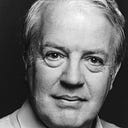My Files, covering birth to “death”, & even madness
Our home filing system looks good, with smart filing cabinets and the drawers each marked. The drawback is the problem of finding things from it. No, I shouldn’t say Our, that’s cowardly and unfair of me — sorry, Maggie — because most of the Stuff is mine, everything from my huge collection of theatre programmes to letters unnecessarily and obsessively kept. I am currently trying to make a start on the mountain of paper this latter tendency produces. Most of it only needs binning, but it’s amazing what I find. Letters which remind me of things I couldn’t possibly have forgotten, but I have. I have given instructions to chuck all this sort of thing when I die; none of it matters except to me.
But, yes, it’s amazing what I find. “Filed” (why?) in one of many vaguely named Old Letters sections and very precious to me — though you’d never think so from the way I’ve kept it, I could only have found it by chance — is my account on exercise book paper of the birth of one of our children. I believe this was something The National Childbirth Trust encouraged partners to write out, and certainly I had forgotten most of the details, as you do with everything however unforgettable it seems at the time. (The pain of giving birth is famous in this way; they say if it were not so there would be no second children.) Maybe the NCT was a bit vague about the purpose of making this record, as I had never typed it up, despite clear indications, such as “Insert -”, that that was my intention.
But it immediately takes me back to that delivery room, and our efforts to concentrate on singing the song that we had been urged to memorise, for the purpose of joint concentration on the contractions of birth, and/or distraction when the midwives wanted the mother not to push. Ours was “Brush Up Your Shakespeare” from “Kiss Me, Kate” — and I see from this handwritten contemporary account that I had myself suggested something simpler like “Ten Green Bottles”. I might have wondered whether the more “actorish” suggestion had come from me. Not that we are not both very into musicals. Maggie maintained that we needed a choice with some complexity, since simple counting songs hardly engaged the mind at all, thus missing the object of the exercise.
Incongruously close in the file drawer was a wildly different reminder come to light. A letter from my old friend Liz, who is in fact my longest established theatre friend. I had been doing “The Importance of Being Earnest” and had in one of my screeds told her — a sometime Gwendolen — how ours had never quite conquered the word ‘metaphysical’ in the Wildean lines “That is clearly a metaphysical speculation, and like most metaphysical speculations has very little reference at all to the actual facts of real life, as we know them.”(Curiously, I saw that same performer play Gwendolen again five years later, elsewhere — and “metaphysical” was spot-on!)
Liz had replied with memories of a similar nightly tussle with the word ‘propagate’. One night she was so pleased when she got ‘propagate’ right, she relaxed — and screwed up on the word ‘owl’. I was very amused by this, and very curious to know how you can mangle that particular monosyllable.
I am not sure that this story — forgotten by me — is not funnier than the similar case I always remember from being in Tom Stoppard’s “Rosencrantz and Guildenstern Are Dead”. “R. & G. Are Dead” contains those scenes which are not in “Hamlet” — but it also contains a lot of scenes that are in the Shakespeare. We all doubled court characters with the Players, a major element in Sir Tom’s play, with a lot of costume swopping in the wings. At one point we hastened back on stage as the court to have one actor, Robert, playing the King announce to us “Hamlet in madness hath Polonius slain, and from his mother’s closet hath he dragged him!” Robert always found this a tongue twister and it used to come out as “Hamlet in madneth hass Polonius slain …” (As it happens, I was later told that he was not the first actor for this to happen to.) We then shortly rushed back into the wings — with Robert kicking himself progressively more about what he had just uttered. Of course he tried harder and harder to sort the words out.
At one performance he concentrated like fury and produced “Hamlet in madness hath ..” with a look that demanded our congratulations. Unfortunately his grip on the speech then did an “owl”, and it continued “… hath Poloniuns .. suss! .. slain, and …”
He would not give up. Next night we got a crackingly correct “Hamlet in madness hath Polonius slain, and from his mother’s closet hath he dragged him!” Victory!
Back into the wings. “Done it” he panted. I could hardly bear to tell him, but I had to — “Robert: what are you wearing on your head?” Robert’s hand slowly went up, to feel. Instead of swopping his Player’s baseball cap for the King’s crown in the quick change, he had put the Player’s cap back on — possibly more concerned with the words he was about to say. Afterwards he kept telling us “Because I could feel something on my head, I was sure I’d gone back on in the crown”.
Next night, he did everything okay.
Naturally I never hear those lines from “Hamlet” without remembering him.
